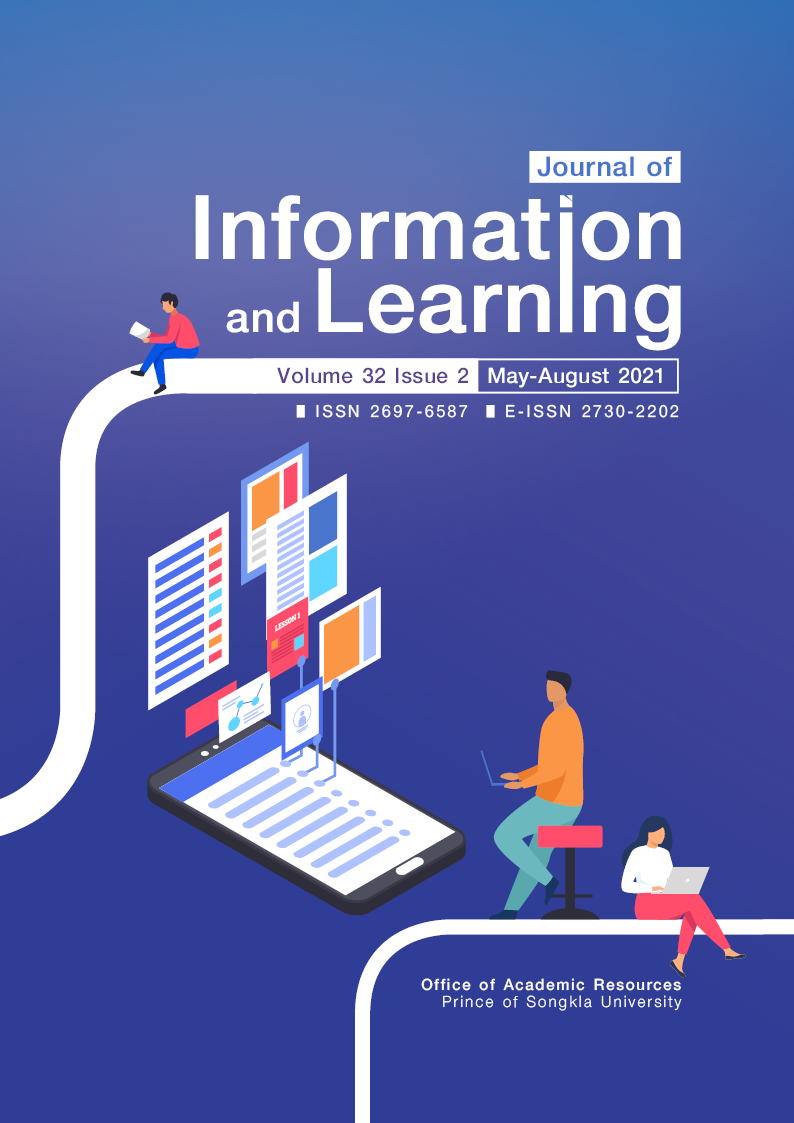Online Education Administration Guidelines for Aviation Management Undergraduates
Main Article Content
Abstract
The purposes of the research were: 1) to study aviation management undergraduates' opinions towards online education administration, 2) to study the relationship between undergraduates' use of digital equipment for online learning and preferred online teaching methods, and 3) to propose the guidelines of online education administration. 464 undergraduates answered questionnaires. The results showed that the majority of the sample felt content by online learning but felt lonely and stressed sometimes; furthermore, they could access and review the study material at their own pace. But, they lacked self-discipline and had more inquiries while studying online. Moreover, they mentioned that lectures assigned too many assignments. The sample had to purchase digital equipment and internet service for online learning. They also stated that they had problems with digital equipment, application, and an internet connection occasionally. According to the survey, the majority of the sample preferred blended online teaching methods. The relationship between undergraduate’s usage of digital equipment for online learning and preferred online teaching methods was significant at the .05 level. Also, the guidelines suggested that lectures should focus on students' diverse backgrounds and implement blended online teaching methods in the online classroom.
Article Details

This work is licensed under a Creative Commons Attribution-NonCommercial-NoDerivatives 4.0 International License.
The Journal of Information and Learning is operated by the Office of Academic Resources, Prince of Songkla University. All articles published in the journal are protected by Thailand copyright law. This copyright covers the exclusive rights to share, reproduce and distribute the article, including in electronic forms, reprints, translations, photographic reproductions, or similar. Authors own copyrights in the works they have created as well as the Office of Academic Resources. The Journal reserves the right to edit the language of papers accepted for publication for clarity and correctness, as well as to make formal changes to ensure compliance with the journal's guidelines. All authors must take public responsibility for the content of their paper.
References
Abou El-Seoud, M. S., Taj-Eddin, I. A., Seddiek, N., El-Khouly, M. M., & Nosseir, A. (2014). E-Learning and students motivation: A research study on the effect of E-Learning on higher education. International Journal of Emerging Technologies in Learning (IJET), 9(4), 20-26.
AlAteeq, D. A., Aljhani, S., & AlEesa, D. (2020). Perceived stress among students in virtual classrooms during the COVID-19 outbreak in KSA. Journal of Taibah University Medical Sciences, 15(5), 398–403.
Allen, I. E., Seaman, J., & Garrett, R. (2007). Blending In: The extent and promise of blended education in the United States. Massachusetts: Sloan-C.
Amiti, F. (2020). Synchronous and asynchronous E-Learning. European Journal of Open Education and E-learning Studies, 5(2), 60-70.
Barak, M., Hussein-Farraj, R., & Dori, Y. J. (2016). On-campus or online: Examining self-regulation and cognitive transfer skills in different learning settings. International Journal of Educational Technology in Higher Education, 13(1), 2-18.
Blaschke, L. M. (2014). Using social media to engage and develop the online learner in self-determined learning. Research in Learning Technology, 22, 1-23.
Buathong, S. (2017). Measurement and assessment of learning skills in the 21st century. Veridian E-Journal Silpakorn University, 10(2), 1856-1867.
Chung, E., Noor, N. M., & Mathew, V. M., (2020). Are you ready? An assessment of online learning readiness among university students. International Journal of Academic Research in Progressive Education and Development, 9(1), 301–317.
Elmer, T., Mepham, K., & Stadtfeld, C. (2020). Students under lockdown: Comparisons of students’ social networks and mental health before and during the COVID-19 Crisis in Switzerland. PLOS ONE, 15(7), 1-22.
Joan, R. (2013). Flexible learning as new learning design in classroom process to promote quality education. I-Manager’s Journal on School Educational Technology, 9(1), 37–42.
Khan, B. H. (2006). Flexible learning in an information society. Pennsylvania: IGi Global.
Labrague, L. J., De Los Santos, J. A. A., & Falguera, C. C. (2021). Social and emotional loneliness among college students during the COVID-19 pandemic: The predictive role of coping behaviors, Social Support, and Personal Resilience. Perspectives in Psychiatric Care, 57(4), 1578-1584.
Nehme, M. (2010). E-learning and students’ motivation. Legal Education Review, 2, 223-239.
New York State Education Department. (2021, July 25). Determining time on task in online education. Retrieved from http://www.nysed.gov/college-university-evaluation/distance-education-program-policies
Peter, O. A., & Lois, F. A. (2020). Use of online collaborative learning strategy in enhancing postgraduates learning outcomes in science education. Educational Research and Reviews, 15(8), 504–510.
Rahiem, M. (2021). Indonesian University students’ likes and dislikes about Emergency remote learning during the COVID-19 pandemic. Asian Journal of University Education, 17(1), 1-18.
Roslan, N. S., & Halim, A. S. (2021). Enablers and barriers to online learning among medical students during COVID-19 pandemic: An explanatory mixed-method study. Sustainability, 13(11), 1-15.
Sethabutra, P., Sripusitto, P., & Wang, H. W. (2018). An exploratory study on the readiness of students towards E-Learning. International Journal of the Computer, The Internet and Management, 26(1), 21-26.
Skylar, A. A. (2009). A comparison of asynchronous online text-based lectures and synchronous interactive web conferencing lectures. Issues in Teacher Education, 18(2), 69-84.
Stanley, D., & Zhang, Y. J. (2020). Collaborative learning in online business education: Evidence from a field experiment. Journal of Education for Business, 95(8), 506–512.
Stauffer, B. (2021, July 25). What’s the difference between online learning and distance Learning? Retrieved from https://www.aeseducation.com/blog/online-learning-vs-distance-learning
The Ministry of Education of Thailand. (2021, July 25). The closure of educational institutions affiliated with and under the supervision of the Ministry of Education due to special circumstances.Retrieved from https://moe360.blog/
UNESCO. (2002). Open and distance Learning-Trends, policy and strategy considerations. Paris: UNESCO.
UNESCO. (2021, October 17). COVID-19 educational disruption and response. Retrieved from https://en.unesco.org/news/covid-19-educational-disruption-and-response
Urdan, T. A., & Weggen, C. C. (2021, October 17). Corporate E-Learning: exploring a new frontier. Retrieved from http://papers.cumincad.org/data/works/att/2c7d.content.pdf
U.S. Department of Education. (2021, July 25). Evaluation of evidence-based practices in online learning: A meta-analysis and review of online learning studies. Retrieved from https://www2.ed.gov/rschstat/eval/tech/evidence-based-practices/finalreport.pdf


